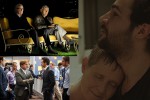As this year’s AFI Fest comes to a close, the time has come to reflect on the final day of feature films and shorts.
All of Thursday’s showings, down to the closing-night gala, are meant to be interest-pieces at heart.
Take “James White” for example. First-time director Josh Mond throws the viewer into a thrilling world by following the titular James, played by Christopher Abbott, through several months of his burgeoning adult life. After recently losing his father, he becomes increasingly uncomfortable with the people and family he’s known and loved, only to learn of his mother’s worsening state as well.
As despairful as it is riveting, “James White” is a film that doesn’t compromise with unleashing sorrow and pain out of its character study of a man whose immaturity pushes his friends out of his life. Out of this year’s domestic flock of debut productions, “James White” is the most impressive.
If “James White” is a film of grief the audience can’t look away from, “Youth” is one for which they’ll want to keep watching for every minute.
Paolo Sorrentino’s latest film is a theatrical joy in every single scene. Michael Caine gives one of his career-best performances as Fred Ballinger, a famous conductor retreating to a Swiss spa with his friend Mick Boyle, played by Harvey Keitel. On the trip, Rachel Weisz’s character Lena Ballinger – Fred’s daughter – and demons from his past come to remind him of his disheartening, forgotten relationships.
“Youth” is the most exquisitely produced film at the festival this year. Sorrentino makes use of classic Italian and Swiss architecture to tell a story of human emotions gone awry. Sorrentino is conducting his own symphony on screen, backed by the use of music and acting prowess, to make an entertaining art piece that can satisfy even the most bitter critics.
However, AFI Fest saved its most interesting film for last.
“The Big Short” is a fictional movie based on Michael Lewis’ “The Big Short: Inside the Doomsday Machine,” an account of how the housing market bubble of the 2000s grew and inevitably popped in 2008. The most intriguing part: it’s directed by Adam McKay, the man whose most dramatic prior outing was 2008’s “Step Brothers.”
For “The Big Short,” McKay has gathered an all-star cast of Christian Bale, Steve Carell, Ryan Gosling, Brad Pitt and more, to tell a dysfunctional, fourth wall-breaking narrative.
The story centers around how just a few economists around the country saw the economy exploding before anyone else did. In a style that could only come from a master of comedy, McKay uses quick editing and obtuse storytelling techniques to surprise the audience at every turn, giving one of the most uninteresting topics in the world a sense of spry silliness.
“The Big Short” won’t appeal to everyone – it will probably make people angry at bankers more than anything. But respect has to be paid for a film so daring and well-written that it can get everyday Americans to laugh at whatever a CDO is.
AFI Fest was full of weird things like that, collecting ideas and incongruities from around the world and putting them on an even playing field. People, inspiration, themes, darkness, humility, acting and love were all at the most universal forms this year.
For a week-long celebration of cinema in Los Angeles, AFI Fest is still the best the city can offer. And for an entertainment-packaged vacation, it was awfully educational, harrowing, depressing and tiring. I look forward to returning next year.
Compiled by Sebastian Torrelio, A&E senior staff.
